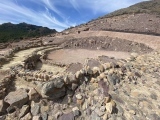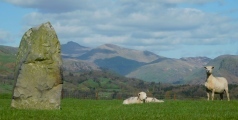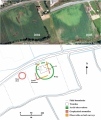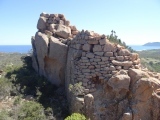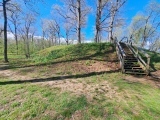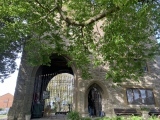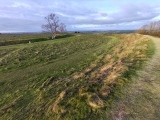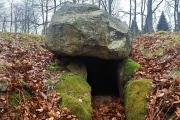Andy Burnham's Blog, page 71
April 19, 2024
Trevalga Cross
This wheel-headed wayside cross is found in front of the church at Trevalga, Cornwall. Is is believed to date from the 8th century. It used to stand by the churchpath but was moved to the churchyard in the early 19th century by the then rector.
Published on April 19, 2024 10:55
April 18, 2024
Yacimiento Arqueológico La Bastida
A very remote site high upon a hill, at the steep borders of a canyon river. It was discovered in 1869, now dated 2200 - 1550 BC - a bronze age city of the Al Algar Culture that conquered cities such as Knossos and Mykonos. Archaeologists are still excavating the hill and probably it was completely inhabited. The defence walls are thick and high. The work, which continues today, shows an authentic city of some 40,000 m2 which, at its peak, some 3,800 years ago, was inhabited by some 1,000 people.
Published on April 18, 2024 15:19
April 17, 2024
Waun Fach
Standing Stone near Llanegryn in Gwynedd. About six feet tall, worn smooth and black by sheltering sheep. Lovely views east towards Birds rock (Craig yr Aderyn) and off towards Cader Idris.
Published on April 17, 2024 13:08
April 16, 2024
Crowland Henge
Archaeologists have unearthed evidence for an evolving sacred landscape spanning centuries in Crowland, Lincolnshire, today dominated by the ruins of its medieval abbey. Local tradition holds that the area was the site of an Anglo-Saxon hermitage belonging to Saint Guthlac, who died in the year 714 and was famed for his life of solitude, having given up a life of riches as the son of a nobleman. The first discovery from the dig was a previously unknown henge - one of the largest in eastern England.
Published on April 16, 2024 13:17
April 15, 2024
Monte Arrubiu Nuraghe
Nuraghe in Sardinia (Sardegna). This spectacularly located nuraghe overlooks the coastal area north of Villaputzu. It consists of two towers - possibly the monument was constructed in two phases. The structure rests upon a large rock outcrop. The western tower has a small window which opens to the N-NW. Below the rock with the nuraghe there are heavily overgrown remains of a settlement.
Published on April 15, 2024 14:33
Shiloh Indian Mounds
Lots of new information added, including videos by Stonetracker linked lower down the page. A well preserved site within the Shiloh National Military Park. Follow the battlefield driving tour between stops 19 and 20. About 800 years ago, a town occupied the high Tennessee River bluff at the eastern edge of the Shiloh plateau. Between two steep ravines, a wooden palisade enclosed seven earthen mounds and dozens of houses. Six mounds, rectangular in shape with flat tops, probably served as platforms for the town’s important buildings.
Published on April 15, 2024 11:43
April 14, 2024
Minster Gatehouse Museum
The collection includes quite a few prehistoric artefacts, photos on our page.. Minster Gatehouse Museum is housed in a 1000 year old grade 1 listed building adjacent to the historic Minster Abbey. Many fascinating local artefacts with connections to the Isle Of Sheppey, fossils and a view from the roof are just some of the attractions.
Published on April 14, 2024 12:20
Figsbury Rings
A circular fort high on a hilltop with fantastic views. It has the outer bank and ditch separated by a wide space from an inner ditch. Why have an inner ditch in a fortification? It is almost as if it is a fort and henge combined. Rather strange.
Published on April 14, 2024 12:20
April 12, 2024
Hegura-jima island
Hegura-jima island is situated 50km northbound from Wajima port in the Sea of Japan (Koreans call it the East Sea). It is only 2km in length and 25m maximum altitude. Once there were 70 cairns on this flat island, now only a few of them remain in seven areas, we have photos:
Published on April 12, 2024 06:46
April 11, 2024
Kongsøre Skov Runddysse 3
A dolmen built in to a mound in Holbæk. Known as Prinsehøjene as the Danish crown prince, later King Frederik d. 7, excavated these mounds in the 1830s. There are two mounds next to each other, restored in 1937. In the eastern mound the chamber is open. In the western mound the chamber is covered with earth.
Published on April 11, 2024 06:55


